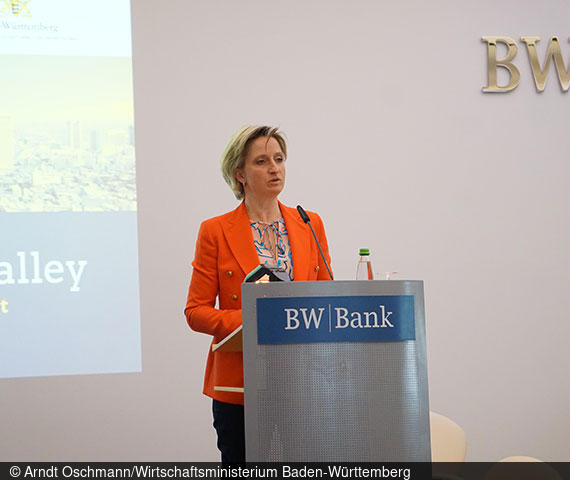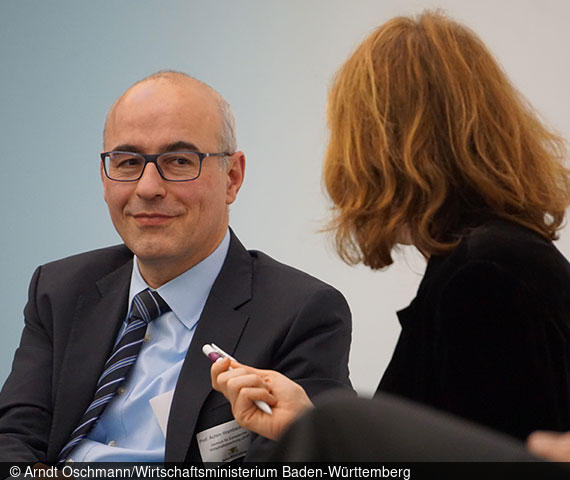Digitalisation in Germany – What Silicon Valley Can Teach Us as an Epicentre of Innovation
EventsA small stretch of land between the Californian cities of San Francisco and San Jose has been setting the pace for digital transformation around the globe. Often referred to as Silicon Valley, this small area is home to the headquarters of the world’s leading tech firms and start-ups and around a quarter of all venture capital worldwide. The question is, what can Germany learn from the example of Silicon Valley and how can we use this knowledge and the resources we already possess to avoid falling (further) behind in this technological race to the top? Finding new strategies and digital solutions for German businesses was the focus of an event organised jointly by the Centre for European Economic Research (ZEW), Mannheim, and the Baden-Württemberg Ministry for Economic Affairs, Labour and Housing held at the Baden-Württembergische (BW) Bank in Stuttgart.
Around 130 guests from the spheres of business, politics and research attended the event, entitled “Catching up with Silicon Valley”, held on 16 April 2018. It quickly became clear that there were not going to be any easy solutions for Germany to catch up with this global epicentre of innovation. In his presentation on “The digital market economy – challenges and prospects”, ZEW President Professor Achim Wambachexplained how digitalisation is leading to structural changes whereby existing markets are being shaken up by the entry of new, innovative competitors. “The dynamics of this development have been rapid,” said Wambach.
In order to close the gap with international leaders on the digital market, it is essential that Germany as a whole and the state of Baden-Württemberg focus on three key missions: broadband expansion, e-government (i.e. digitalisation of public services) and investment in digital business models. “We also need to start making the most of the horsepower we already have,” added the president of ZEW.
“We are in a global competition”
As Andreas von Bechtolsheim, founder of Sun Microsystems and one of the first to invest in Google, pointed out in his lecture from the US via live feed, though the funds for investment in digitalisation are there, Germany still has relatively few success stories comparable to the internet giants of Silicon Valley, such as Google or Facebook, to boast of. Bechtolsheim reiterated his point from another ZEW conference back in 2015 that it is generally easier for US firms to grow comparatively quickly because the US market is much bigger and more homogeneous than in Europe. Despite these differences, Bechtolsheim reminded the audience, “We are in a global competition.”
As Bechtolsheim pointed out, Silicon Valley is ultimately a very small circle of companies. The focus, therefore, is on using new, innovative business models to expand globally. “Where can we invest and where will we get a decisive advantage from our investment in the long term – these are questions that businesses should be asking themselves on a global scale,” said Bechtolsheim.
Baden-Württemberg to invest a billion euros in digitalisation
Under the leadership of Dr. Nicole Hoffmeister-Kraut, the Baden-Württemberg Ministry for Economic Affairs, Labour and Housing is taking the issue of digitalisation as a top priority. Accordingly, the state government plans to invest roughly a billion euros in digitalisation over the coming legislative period. According to Hoffmeister-Kraut, Baden-Württemberg currently finds itself in the middle of the industrialisation of the internet, a process that will prove decisive for the future of the region. While catching up with the US in terms of the commercial sector may no longer be an option, in the industrial sector this may still be a possibility. “We need to find and take our own path,” said the minister, “how we choose to shape the future of artificial intelligence and the Internet of Things, particularly in Baden-Württemberg’s thriving automotive industry, will become a crucial question in the future.” This is where ZEW can act as a reliable cooperation partner for both local governments and businesses.
The evening’s panel debate, moderated by Silke Wettach, Brussels correspondent at the magazine “Wirtschaftswoche”, provided some additional perspectives to those presented in the opening lectures. Though Nicole Hoffmeister-Kraut conceded that Andreas von Bechtolsheim’s experiences in Silicon Valley were somewhat sobering, she believed that Germany could still learn from the Californian tech hub, for example by supporting small and medium-sized enterprises through the ongoing structural changes in the economy and by encouraging more women to get into STEM subjects (Science, Technology, Engineering and Mathematics).
“We must allow a phase of experimentation”
Meanwhile, Dr. Georg Müller, CEO of the energy company MVV Energy, saw it as the duty of companies themselves to deal with digital transformation by making changes to their own internal structures. “It is the job of companies to foster a certain underlying sense of optimism among their own employees,” said Müller. According to Müller, businesses and governments are equally responsible for creating the conditions to keep Germany competitive on an international level. Government regulations are the right way to go as long as they are based on the right real-life examples.
As ZEW President Achim Wambach argued, regulators and competition authorities are already working intensively on this very issue. According to Wambach, abuse control is the best instrument to use. However, in such a highly dynamic market it is also necessary to create a certain amount of leeway. “We must allow a phase of experimentation,” said Wambach, describing Silicon Valley in this respect as “a kind of tractor”. However, we shouldn’t just be looking in one direction. Alongside the US, Israel is also cultivating a thriving start-up environment, while in China companies are already rolling out new technologies “that we here in Germany haven’t even thought of yet”, according to Wambach.

